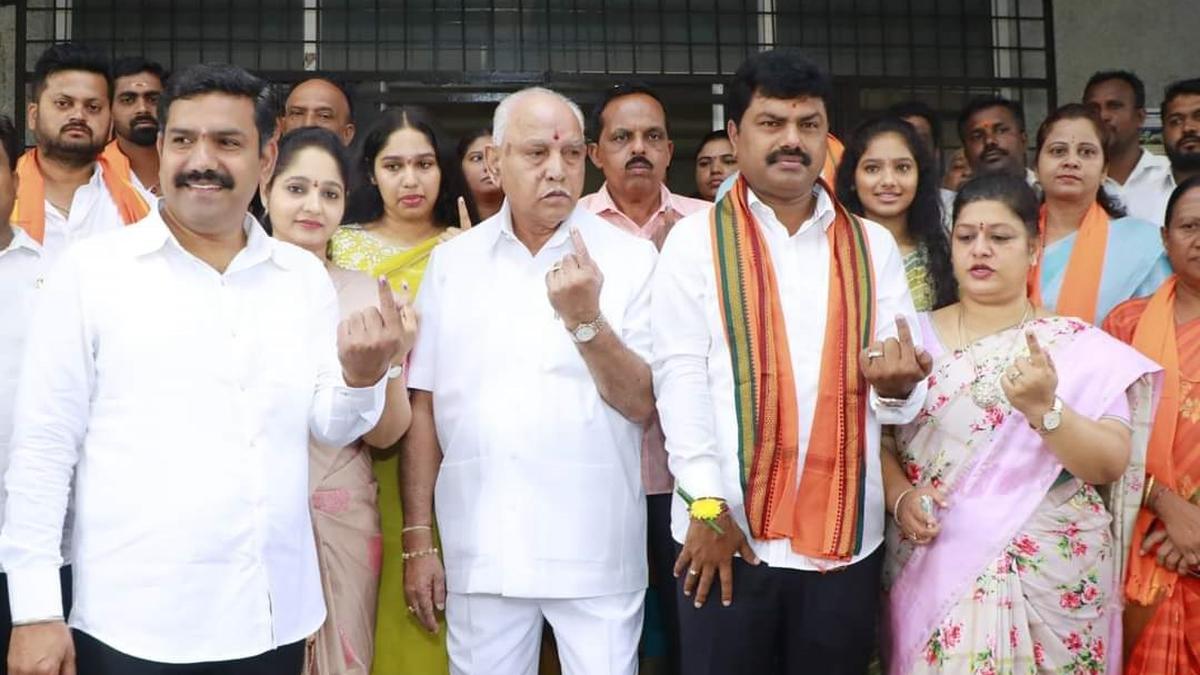
Curtains come down on polling in Karnataka; it is now a month-long nail-biting wait
The Hindu
As the curtains came down on the hard-fought and high-pitched Lok Sabha elections amid the sweltering heat in Karnataka on Tuesday, it will be nearly a month-long tense wait for the electoral fortunes to be known. The counting of votes across the country will take place on June 4. Amid the prevailing drought, the worst in four decades the State is facing, which is likely to impact the results, the ruling Congress fought on the plank of five guarantees and “injustice” meted out to the State by the Centre in terms of tax devolution and drought relief, while the BJP ran the “Modi development” agenda and the Hindutva plank. The diatribe by Congress and BJP leaders against each other in the nearly month-long election campaign also drowned several important issues that affect the electorate across the State.
As the curtains came down on the hard-fought and high-pitched Lok Sabha elections amid the sweltering heat in Karnataka on Tuesday, it will be nearly a month-long tense wait for the electoral fortunes to be known. The counting of votes across the country will take place on June 4.
Amid the prevailing drought, the worst in four decades the State is facing, which is likely to impact the results, the ruling Congress fought on the plank of five guarantees and “injustice” meted out to the State by the Centre in terms of tax devolution and drought relief, while the BJP ran the “Modi development” agenda and the Hindutva plank. The diatribe by Congress and BJP leaders against each other in the nearly month-long election campaign also drowned several important issues that affect the electorate across the State.
While 14 Lok Sabha constituencies in south Karnataka region, including two coastal constituencies, went to the polls on April 26 as part of the second phase, the remaining 14 Lok Sabha constituencies in Kalyana Karnataka, Kittur Karnataka, and one coastal constituency, went to the polls as part of third phase on Tuesday.
The Congress seems to have challenged the BJP in most constituencies through the effective implementation of the five guarantees, which it promised ahead of the 2023 Assembly elections. It set a counter-narrative to the BJP’s Hindutva plank or the “Modi effect” through the guarantees and a more organised campaign, making the poll outcome prediction difficult. The margin of victories could be narrow, as a result. Political observers believe that this election, in the absence of a perceived wave, was fought at the constituency level with each displaying different trends based on individuals and local issues.
Midway through the election campaign, the alleged sexual exploitation case involving the Janata Dal (Secular) Hassan MP Prajwal Revanna created a pan-Karnataka narrative against the BJP for aligning with the JD(S), which has now transcended the State borders. The persistent Congress attack is learnt to have put the BJP on the defensive, and has embarrassed the JD(S).
Political observers also believe that the alleged sexual exploitation case provided the Congress with a lever to contain the possible polarisation of votes in favour of the BJP after the killing of Congress councillor’s daughter Neha Hiremath. The incident in Hubballi was perceived to have consolidated the powerful Lingayat votes in favour of the BJP in north Karnataka constituencies, most of which are dominated by various Veerashaiva-Lingayat sub-castes.
The parliamentary election results are being keenly awaited as the BJP and the JD(S) went to the polls in a formal alliance for the first time. The future of the alliance is being tied to the election outcome. Though contesting in only three seats, the JD(S) is seeing this as a battle for survival and retaining its identity in the Vokkaliga politics. The BJP faces the uphill task of repeating the good show of 2019 when it won 25 seats. The results could also reflect on the leadership of the new BJP State president B.Y. Vijayendra, son of Lingayat strongman and former Chief Minister B.S. Yediyurappa.

The girl, who was admitted to Aster CMI Hospital with alarming breathlessness and significant pallor, was diagnosed with Wegener’s Granulomatosis (now known as Granulomatosis with Polyangiitis or GPA), a rare autoimmune condition that causes spontaneous bleeding in the lungs, leading to acute respiratory failure.

ACB files case against IPS officer N. Sanjay in Andhra Pradesh. The official is accused of manipulating the tender processes for awarding contract for development and maintenance of AGNI-NOC portal, and conducting awareness meetings for SC/STs. It is alleged that the total value of properties stolen, or involved in the case is estimated at ₹1,75,86,600.









